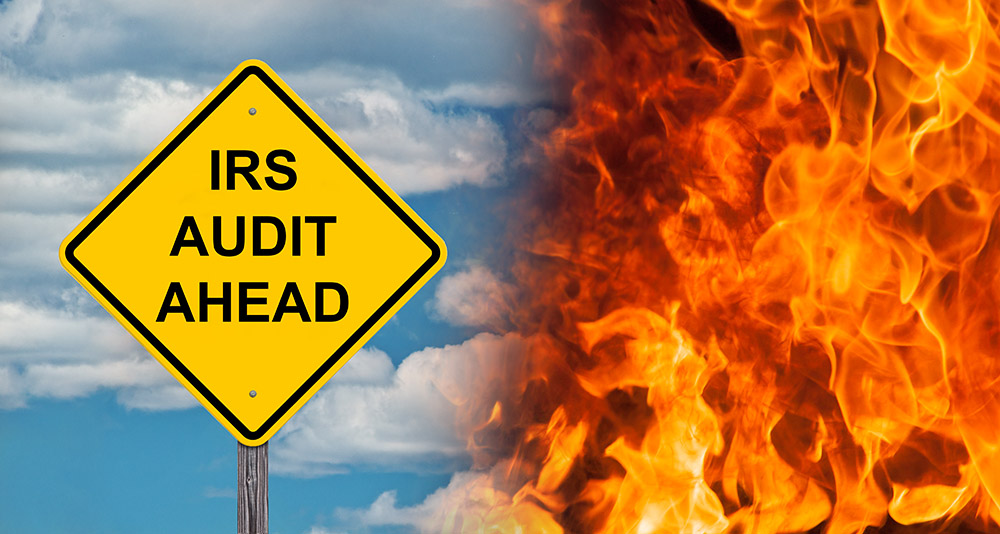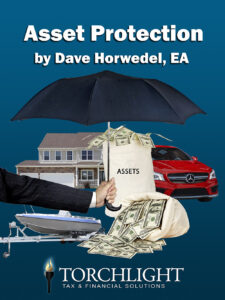By Dave Horwedel, EA
Taxpayers are terrified of audits. This is understandable. They can be a lot of hassle. However, if your tax preparation was done properly, then you really do not have much to worry about.
Now, if you cheated or fudged on your taxes, then that is a different matter. My first piece of advice is do your taxes correctly and do not cheat.
My second piece of advice is to hire a competent CPA, EA, or Tax Attorney to do your taxes unless you are fully competent at doing your own taxes up to the level of complexity of your returns.
At Torchlight Tax, our job is to minimize your taxes without cheating or putting you at risk.
The probability of being audited is dictated by three factors:
The first factor is your income level.
The second factor is what activities are reported on your tax returns.
The third factor is whether your tax return contains anything unusual or suspicious.
Deducting call girls as a business expense might trigger an audit. Administrative assistance or tech support are less likely to be challenged.
Starting with the income level, let me share statistics straight from the IRS website. In 2021, approximately 150 million individual income tax returns were filed, out of which 909,000 were audited. That is 0.6 percent, which is less than one percent.
However, you can’t simply say you have a 0.6 percent chance of being audited. It depends on your income level. The more money you make, the higher the probability of being audited. This makes sense. If you are in the IRS and you want more tax collections, you would likely get more collections by targeting higher income levels.
Here are the statistics broken down by income levels:
– If you make under $500,000, you have a 0.5 percent chance of being audited.
– If you make $500,000 to $1 million, you have a 1 percent chance of being audited.
– If you make $1 million to $5 million, you have a 2.2 percent chance of being audited.
– If you make $5 million to $10 million, you have a 4.2 percent chance of being audited.
– If you make $10 million and up, you have a 6.7 percent chance of being audited.
Certain activities can substantially increase the audit risk. For example, if you have a Schedule C on your tax return, which reports business income for independent contractors, sole proprietors, or unincorporated business owners, it increases your audit risk.
Schedule C gives a taxpayer who wants to lower his tax bill the opportunity to claim false expenses or not report all his gross receipts. A wage earner does not have this opportunity.
Having losses on your Schedule C further increases the audit risk. Large losses or consistent losses, year after year, can attract IRS attention.
In addition, certain deductions that are high compared to your income can increase your audit risk. Suppose you make $100,000 a year and report $60,000 of charitable contributions. The IRS may be more likely to audit you as it appears out of the norm.
There is no reason NOT to take legitimate deductions. If your income was $100,000 and you made those donations—TAKE THEM!
If you have losses in your business, TAKE THEM!
Not reporting all your income also raises audit risk. This is especially true when you have income that is reported to the IRS that does not show up on your tax return.
A 1099 or W-2 not entered on a tax return is almost a guaranteed audit. The IRS computer sees it is missing, and you are selected for an audit. The IRS knows you got that W-2 or 1099 because it was sent to them.
Errors on a tax return invite audit. If you have missing documents, it might be wise to file for an extension. Then, usually in late May, you can request an unmasked Wage and Income Transcript from the IRS.
This gives you all the data that has been reported to the IRS. That way you do not miss reporting a 1099, W-2, or another form that invites an audit. (By getting an unmasked copy, you have the full Employee ID number, etc. needed to file a tax return.)
One other point is that Schedule Cs are more likely to be audited than small corporations are.
This is a result of the quality of preparation. S Corporations are more likely done by an EA or CPA and have fewer obvious errors.
Also, your chances of audit increase as the IRS gets more funding. With 87,000 IRS agents reportedly coming on, one would expect higher audit levels.
If you have any questions, please feel free to email dave@torchlighttax.com You are welcome to subscribe to our newsletter, or share this article.


